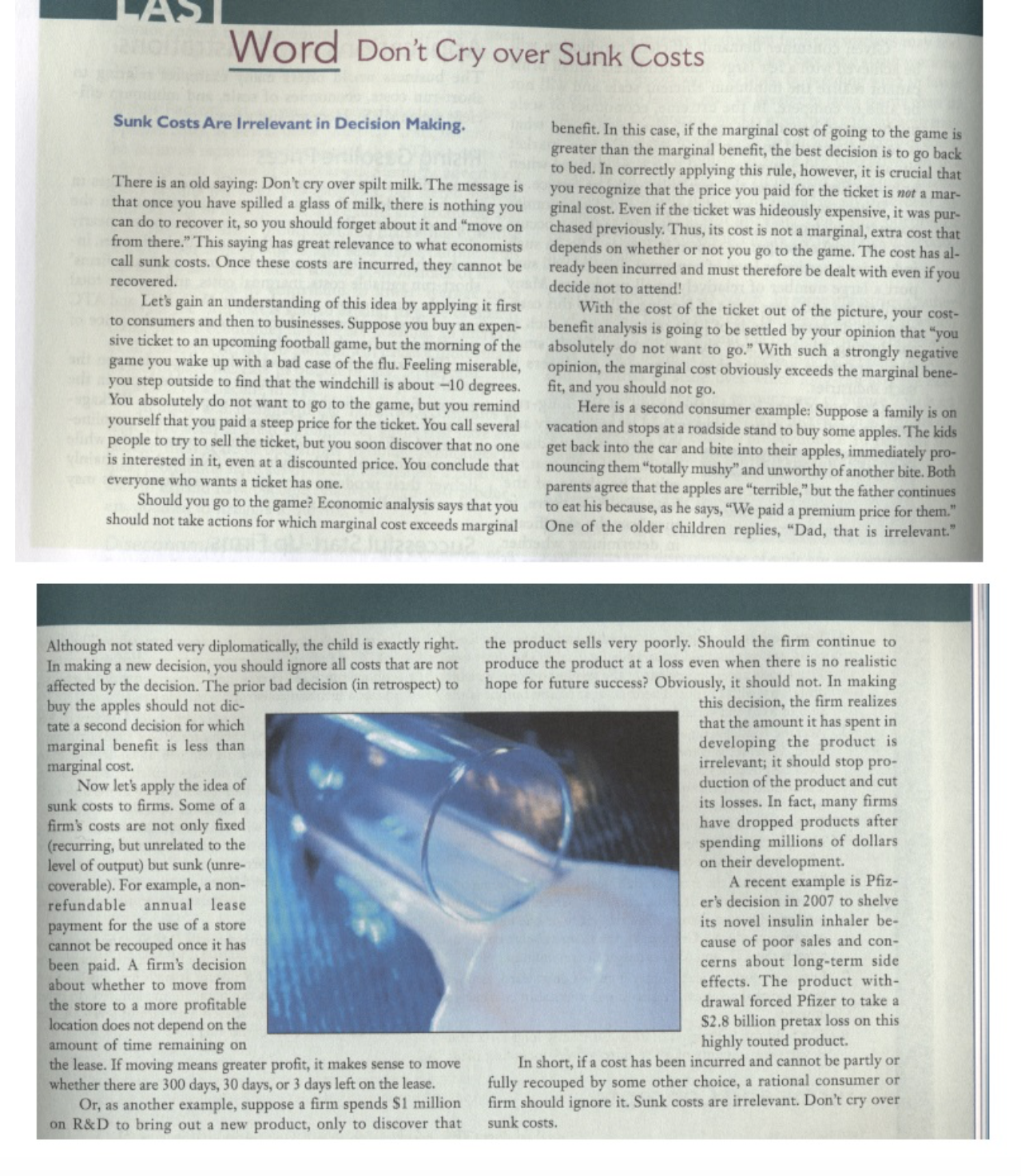HELLO need tutoring help regarding these questions based on the text (posted below as picture)
If you had the flu, would you go to the game? Is this rational? Would you continue to eat the apple as the 'Dad' did?
Can you think of other examples where you 'cried overspiltmilk'?
Did it make sense for Pfizer to scrap their insulin inhaler?
TEXT FOR QUESTIONS
Word Don't Cry over Sunk Costs Sunk Costs Are Irrelevant in Decision Making. benefit. In this case, if the marginal cost of going to the game is greater than the marginal benefit, the best decision is to go back There is an old saying: Don't cry over spilt milk. The message is to bed. In correctly applying this rule, however, it is crucial that that once you have spilled a glass of milk, there is nothing you you recognize that the price you paid for the ticket is not a mar- can do to recover it, so you should forget about it and "move on ginal cost. Even if the ticket was hideously expensive, it was pur- from there." This saying has great relevance to what economists chased previously. Thus, its cost is not a marginal, extra cost that call sunk costs. Once these costs are incurred, they cannot be depends on whether or not you go to the game. The cost has al- recovered. ready been incurred and must therefore be dealt with even if you decide not to attend! Let's gain an understanding of this idea by applying it first to consumers and then to businesses. Suppose you buy an expen- With the cost of the ticket out of the picture, your cost- sive ticket to an upcoming football game, but the morning of the benefit analysis is going to be settled by your opinion that "you game you wake up with a bad case of the flu. Feeling miserable, absolutely do not want to go." With such a strongly negative you step outside to find that the windchill is about -10 degrees. opinion, the marginal cost obviously exceeds the marginal bene- fit, and you should not go. You absolutely do not want to go to the game, but you remind yourself that you paid a steep price for the ticket. You call several Here is a second consumer example: Suppose a family is on people to try to sell the ticket, but you soon discover that no one vacation and stops at a roadside stand to buy some apples. The kids is interested in it, even at a discounted price. You conclude that get back into the car and bite into their apples, immediately pro- everyone who wants a ticket has one. nouncing them "totally mushy" and unworthy of another bite. Both Should you go to the game? Economic analysis says that you parents agree that the apples are "terrible," but the father continues should not take actions for which marginal cost exceeds marginal to eat his because, as he says, "We paid a premium price for them." One of the older children replies, "Dad, that is irrelevant." Although not stated very diplomatically, the child is exactly right. the product sells very poorly. Should the firm continue to In making a new decision, you should ignore all costs that are not produce the product at a loss even when there is no realistic affected by the decision. The prior bad decision (in retrospect) to hope for future success? Obviously, it should not. In making buy the apples should not dic- this decision, the firm realizes tate a second decision for which that the amount it has spent in marginal benefit is less than developing the product is marginal cost. irrelevant; it should stop pro- Now let's apply the idea of duction of the product and cut sunk costs to firms. Some of a its losses. In fact, many firms firm's costs are not only fixed have dropped products after (recurring, but unrelated to the spending millions of dollars level of output) but sunk (unre- on their development. coverable). For example, a non- A recent example is Pfiz- refundable annual lease er's decision in 2007 to shelve payment for the use of a store its novel insulin inhaler be- cannot be recouped once it has cause of poor sales and con- been paid. A firm's decision cerns about long-term side about whether to move from effects. The product with- the store to a more profitable drawal forced Pfizer to take a location does not depend on the $2.8 billion pretax loss on this amount of time remaining on highly touted product. the lease. If moving means greater profit, it makes sense to move In short, if a cost has been incurred and cannot be partly or whether there are 300 days, 30 days, or 3 days left on the lease. fully recouped by some other choice, a rational consumer or Or, as another example, suppose a firm spends $1 million firm should ignore it. Sunk costs are irrelevant. Don't cry over on R&D to bring out a new product, only to discover that sunk costs







